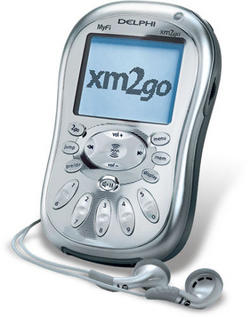
XM Recording Is Easy; Issue Is Difficult
David ColkerTechnopolis
June 29, 2006
You wouldn't know it by talking to mild-mannered accountant Mark Desimone, but he has a wild side.
When a song by the raucous Van Halen starts playing on his new portable XM satellite radio, Desimone can record it and store it for free — all with the press of a button on his Pioneer Inno.
"Now, I have 'Jump,' 'Panama' and other songs I can play whenever I want," he said. It's great for Desimone, who likes to rock out when he's not working on spreadsheets.
But not so great in the view of the recording industry, which believes that it's not being fairly compensated for how the Inno can use music.
Last month the Recording Industry Assn. of America sued XM Satellite Radio Inc., alleging that it's violating copyright laws.
Inno is one of the most expensive and sophisticated models of portable radios that XM offers to hear its programming. Competitor Sirius Satellite Radio Inc. is expected to offer a similar unit this summer.
It's not the device's ability to simply record satellite radio that has the recording industry upset. Other XM units do that.
But users of the Inno have the ability — while on the go — to save individual songs that can be later mixed with downloaded tracks from a user's personal collection. It can also record whole shows off the satellite that can be made part of a mix for later listening.
Think of it as a combined TiVo and iPod for satellite radio.
And in this way it's one of the most innovative — if not flawless — portable entertainment devices to arrive on the scene.
Innovation doesn't come cheap. The cellphone-sized device sells for nearly $400, plus $12.95 a month for the satellite service. Pricing is the same for a similar XM unit, the Samsung Helix. Both radios came out in April.
For the most part, the Inno is easy to use. Its controls for listening to and recording satellite radio are especially intuitive — you almost don't need the manual for these functions.
The approximately 170 XM radio channels are displayed on a bright screen on the unit, five channels at a time. To make it easier to find a type of programming, they can also be presented by genre, such as rock, Latin, kids, classical and news. You can also build a personal "favorites" list of channels.
Like other satellite radio portables, the Inno doesn't work well indoors, although I sometimes got reception by holding it near a window. For more regular use indoors, it can be parked in an included dock that uses an external, plug-in antenna.
To record a song, you can press the record button even after it has begun. That's because the Inno is always recording whatever channel is on, with a 10-minute buffer.
This doesn't work if you are channel-surfing and happen to come upon a song in progress. The radio has to be tuned to the channel playing the song from its beginning to capture it all.
Still, the Inno's timing is not quite right. On several songs I recorded, the saved tracks had the first and/or last few notes cut off. This led to some disruptive listening — disappointing, to say the least, for a device this expensive. I hope the problem will be fixed down the line.
The record function can also be set to run continuously, and XM says there is enough room on the Inno's 1-gigabyte memory for 50 hours of programming.
Any radio content saved on the device can be heard as long as the user's subscription stays in force. Let your subscription expire, and the Inno is simply a very expensive MP3 player. In comparison, you can get a 1-gigabyte iPod for $149.
Organizing recorded tracks into customized playlists is fairly easy. Using the buttons on the unit and a virtual keyboard on the screen, you can put together songs for listening while at the gym, during a romantic dinner or for other occasions.
Matters get more complicated when downloading tracks from a PC. (The device can't download from a Macintosh computer.) It took me a couple of hours to set up and use the required software that incorporates Napster, an online downloading service. I'm sure I'd get better at this in time, but the process is too complicated.
The legal battle over the Inno will possibly be a long one. XM's position is that using the device's record function is no different from the days when we taped broadcast radio on cassette recorders. (Remember them?) The XM portables, company spokesman David Butler said, "simply allow people to do what has been allowed and protected by the law for decades."
The recording industry association counters that the ability to record an individual song and put it into a playlist changes things.
"That makes it a digital jukebox," association President Cary Sherman said, "and that needs to be licensed."
Congress might get into the act too. A pending bill, co-sponsored by Sen. Dianne Feinstein (D-Calif.), would restrict use of taped satellite radio content.
In the meantime, Desimone can enjoy his Van Halen tracks. "On weekends," he said in a near monotone, "I put my Inno on my Harley."
The Bakersfield resident might seem mild-mannered, but I wouldn't want to try to take away his Inno.